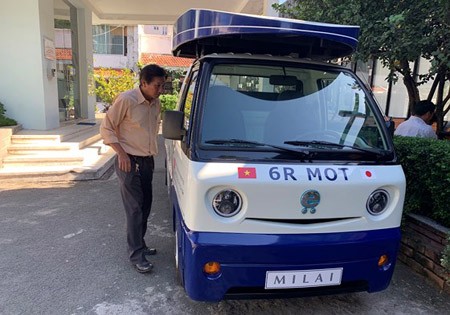
This is the project supported by the Japan’s Ministry of Environment and managed by the Global Environment Center Foundation (GEC). It was successfully piloted by SIHUB during 5 months of trial on waste treatment at Thu Duc Produce Wholesale Market in HCMC.
MILAI’s biodegradable waste treatment technology possesses the benefit of inhibiting CO2 emission into the atmosphere from the transportation time to the release of final products. What is more, it allows waste to be handling right at immediate stations located at each ward or commune without stinking.
This efficient advanced technology has two main components to form a closed loop system, one of which is an electric car to collect garbage, and the other is the treatment machinery.
Organic waste is first gathered by one of those special cars, which run on the newly created recycled power itself, to a station sited in a local area. After that, it is classified and forcefully dried in air bags in 4 to 5 days, thanks to heat and wind formed by solar battery cells. This phase reduce the amount of water from 80 percent to 20 percent while preventing microorganism from making awful smell.
Following the previous stage is the carbonization, where dried garbage is burnt in an anaerobic environment to produce coal, which will be ground and molded into small bars. The two final products of this whole process are gas and carbide fertilizer (ultimate ash of carbon, which is clean and possesses a high level of activated carbon).
Thanks to the minimum emission of CO2, the treatment does not worsen the current green house effect, and its gas powers an electricity generator for the waste collection cars or is used for other purposes. The fertilizer can improve the productivity of crops, become unbaked bricks, or water filter material.
According to Mr. Ichiro Hatayama, President of MILAI Corporation, his organization hopes to transfer and then localize this advanced technology in Vietnam since it is extremely suitable for the types of organic waste in the nation. He wished to form more cooperation with various domestic partners.
SIHUB shared that the 6R technology has been basically transferred to one mechanics company in HCMC, and received one application request from a Japanese supermarket in the city.
It is worth noticing that because of the 90 percent localization, the overall cost has been reduced by at least 30 percent, making it a lucrative advantage.
SIHHUB’s Director Huynh Kim Tuoc also informed that the new policy on waste classification in HCMC is expected to make this advanced technology’s implementation much smoother. SIHUB is, therefore, eagerly seeking partners to transfer it.
























